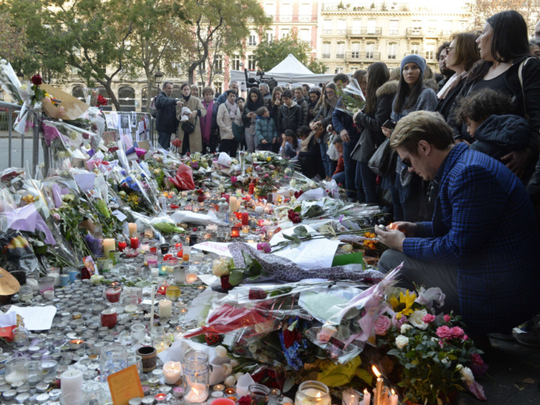
‘Before we can speak of anything else, we must speak of the victims,” said the Guardian in an emotionally charged editorial. “Amid all the noise that follows an act of horrific violence, amid the din of debate and argument, it can be easy to stop hearing the pain of the event itself. Paris is mourning the loss of at least 129 people who, on Friday, were engaged in the harmless, happy business of normal life ... Now they are dead, murdered in utterly terrifying circumstances. The survivors, the injured, the entire French people, already wounded by the lethal attacks in January, are reeling from the shock. In their loss, in their grief, in their pain, we are with them.”
The New York Times, in a series of editorials, reflected on Daesh’s (the self-proclaimed Islamic State of Iraq and the Levant) evolving terror strategy across the world. “The terrorist attacks in Paris, along with twin bombings in Beirut the day before, and the downing of a Russian jetliner over the Sinai Peninsula on October 31, show a new phase in [Daesh’s] war against the West, a readiness to strike far beyond areas it controls in Iraq, Syria, and increasingly, Libya.” While acknowledging that the challenge for threatened countries was huge, the paper warned that the sort of attacks Daesh has launched are hard to anticipate or prevent. “Yet, in Europe, each one intensifies the raucous xenophobia of far-right nationalists ever ready to demonise Muslim citizens, immigrants and refugees and shut down Europe’s open internal borders ... France already has some of Europe’s most intensive anti-terror policing. Adopting draconian measures of the sort demanded by far-right nationalists like Marine Le Pen of the National Front can only further alienate France’s Muslim population of five million, without offering any assurance against more attacks.”
In an editorial titled ‘What is the sensible response to this horrific act?’ the Los Angeles Times noted on the same vein: “Not for the first time, a small but determined group of terrorists has been able to exploit the openness of western society to commit murder and mayhem on a monstrous scale. Nations such as France and the US need to find a way to respond to that asymmetric threat without curtailing civil liberties or closing their borders.”
In Canada, the Toronto Star said in an editorial: “Prime Minister Justin Trudeau spoke for all Canadians when he said our hearts go out to the people of France in a dark and terrible time. We too have felt the shock of terror, in the recent assault on parliament and other attacks. We share France’s grief and outrage and applaud its vow to meet terror with cold resolve.”
In Japan, the Asahi Shimbun said in an editorial that such “barbarous act of violence on citizens can never be forgiven,” and urged the international community to “work together to support all efforts to eradicate terror… France is not the only nation that is bearing the brunt of terrorism. Every citizen should be reminded that his or her country could be facing the same danger tomorrow.”
In India, the Hindu newspaper noted that the Paris attackers “had chosen their targets with chilling care, picking sites where strangers share an unspoken camaraderie. The aim was to do more than take innocent lives — it was to provoke an us-versus-them retaliation, to make its people and visitors fearful of going about their everyday routines and enjoyment.”





_resources1_16a31069e4e_small.jpg)






